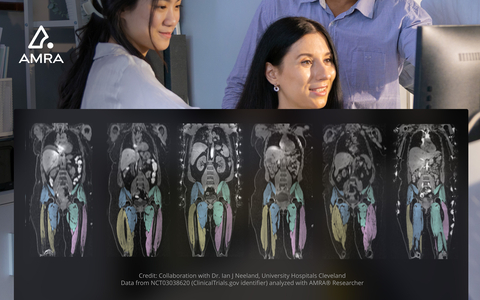AMRA Medical - a health informatics and precision medicine company that is pioneering body composition research through gold-standard MRI-based analysis platforms - collaborated on a study driven by University of Texas Southwestern and University Hospital Cleveland to publish new data revealing the effect of liraglutide treatment on muscle composition in adults with obesity.
Results from a randomized, double-blind trial in diabetes-free adults living with obesity and high cardiovascular disease risk showed that liraglutide was associated with a reduction in both muscle fat infiltration and prevalence of adverse muscle composition when compared to placebo
LINKÖPING, Sweden--(BUSINESS WIRE)-- AMRA Medical - a health informatics and precision medicine company that is pioneering body composition research through gold-standard MRI-based analysis platforms - collaborated on a study driven by University of Texas Southwestern and University Hospital Cleveland to publish new data revealing the effect of liraglutide treatment on muscle composition in adults with obesity.
This press release features multimedia. View the full release here: https://www.businesswire.com/news/home/20240502719692/en/

Credit: Collaboration with Dr. Ian J Neeland, University Hospitals Cleveland. Data from NCT03038620 (ClinicalTrials.gov identifier) analysed with AMRA® Researcher
The analysis included 128 diabetes-free adults with obesity who received a lifestyle intervention in addition to being randomized to either a liraglutide (n = 73) or a placebo (n = 55) treatment group. Using the proprietary MRI-based AMRAⓇ Researcher, baseline and follow-up muscle composition analyses were performed, with the primary objective of assessing change in thigh muscle fat infiltration due to treatment intervention over a 40-week period. Participants were also assessed for the exploratory outcome of adverse muscle composition, defined as high muscle fat infiltration and low muscle volume z-score.
Among the 128 participants, median muscle fat infiltration at baseline was 7.8%. The study found that liraglutide significantly reduced muscle fat infiltration when compared to placebo. The mean percent change in muscle fat infiltration for those randomized to liraglutide was -2.87% from baseline, and 0.05% in the placebo arm (absolute change: -0.23% vs. 0.01%). Additionally, a weight-invariant assessment of muscle volume was performed using AMRA’s muscle volume z-score did not show a significant reduction comparing liraglutide to placebo (mean treatment difference adjusted for baseline muscle volume z-score was -0.08 standard deviations). The study also uncovered that the proportion of participants with adverse muscle composition dropped from 11.0% to 8.2% over follow-up in the liraglutide arm, while no change in the placebo arm was observed.
While the contribution of muscle fat infiltration improvement to the cardiometabolic benefits of liraglutide requires further investigation, the above findings come at a critical time given the global rise of obesity incidence and its comorbidities posing more of a threat to patients than ever before. As the treatment paradigm begins to shift from solely lifestyle changes to one that includes pharmacological intervention (namely the popular GLP-1 agonists such as liraglutide) and drug development in obesity ramps up, it is paramount that these drugs are accurately assessed for their impact on muscle composition to ensure that the weight loss they help to achieve does not result in adverse effects on muscle health.
Through their gold-standard MRI-based body composition analysis technology, AMRA is committed to pioneering the creation of normative datasets explaining the effect of GLP-1s and incretin-based treatments on muscle composition to help the obesity field gain further insight as to how these drugs work in this relatively new indication. Recently, AMRA presented related findings at the 59th European Association for the Study of Diabetes Annual Meeting, where it was shown that another popular GLP-1, tirzepatide, achieved significant weight loss without any adverse effects on muscle composition. You can view the presentation here.
Learn more about AMRA Medical and how the use of MRI-based body composition analysis is advancing disease research in metabolic diseases including obesity, and beyond.
About AMRA Medical
AMRA Medical is a health informatics and precision medicine company that is pioneering body composition analysis, providing cutting-edge solutions to advance both clinical research and patient care initiatives. AMRA’s gold-standard technology delivers multiple fat and muscle biomarkers - derived simply from rapid whole-body MRI scans. AMRA is committed to driving transformative care and simplifying vital decision-making in both research and clinical care settings by offering support services via their innovative platform.
Learn more about AMRA Medical’s MRI-based solutions at https://amramedical.com/solutions, or connect with our team of experts for a detailed discussion at info@amramedical.com.
Follow AMRA on LinkedIn for the latest updates in body composition and precision medicine.
View source version on businesswire.com: https://www.businesswire.com/news/home/20240502719692/en/
Contacts
AMRA Medical
Marie Börjesson, VP Brand & Marketing
0046 70 628 1977
marie.borjesson@amramedical.com
Source: AMRA Medical
Credit: Collaboration with Dr. Ian J Neeland, University Hospitals Cleveland. Data from NCT03038620 (ClinicalTrials.gov identifier) analysed with AMRA® Researcher
View this news release and multimedia online at:
http://www.businesswire.com/news/home/20240502719692/en







